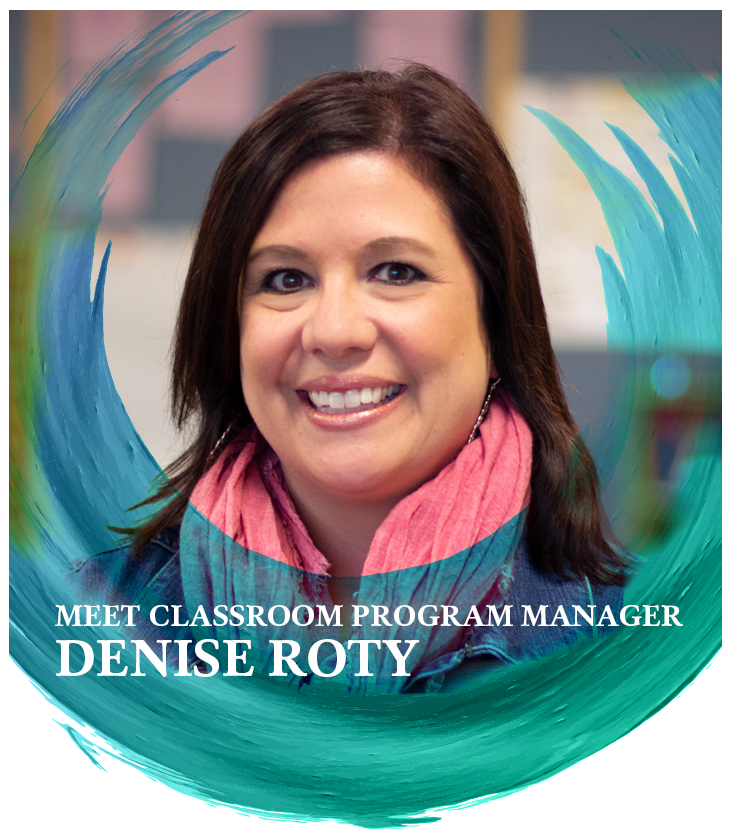Since BHSC is full of wonderful staff that are making differences in the lives of those we see every day, we thought it would be fun if you got to know us better! Let’s learn about Denise with her Fast Four about BHSC and being a Program Manager.
Denise has been at BHSC for 17 years. She was originally hired on as a Behavioral Specialist in the social work department and after about 4 years she transitioned into a supervisory role as a classroom program manager for the integrated preschool classrooms. Her role expanded to include oversight of the Maryvale center-based classrooms and the social/emotional/behavioral classroom at the North Street location. As a program manager at BHSC, Denise’s responsibilities include curriculum oversight, social/emotional development of the children, communication with school districts, student enrollment, providing support/supervision to the staff and interacting with collaborative partners. She helps maintain a safe learning environment and is held accountable for regulating bodies in the classrooms that she oversees.
What is your favorite memory at BHSC?
It’s challenging after all these years to just pick one memory as my favorite. What I can say is that our end-of-the-year graduation ceremonies immediately come to mind as memorable occasions as they are the culmination of the hard work of our students and staff. These celebrations remind us of where the children started and how far they have come (usually by way of a tear-jerking slide show presentation!) These ceremonies are filled with so much emotion and are a true reflection of the heart and soul of what BHSC does each and every day.
I remember one occasion when I walked into a classroom and there was a little boy there who had been having some challenges the past few mornings, and he was there with his mother and grandmother who brought him to school. He was a pretty articulate little guy who had some behavioral challenges but in that particular moment, he was very proud to be at school with his mom and his grandmother and he was just beaming from ear to ear. When I walked in I said hello to him, he looked at me, paused and then said, “Mom and Grandma I want to introduce you to my friend, Ms. Denise.” He was so proud, and in that moment he demonstrated skills he had learned through the second step social-emotional curriculum. It was really heartwarming to see him so excited to introduce his biological family to his school family! And that is really what we want for our kids in this program, to have a positive experience at school, to like school and to feel safe and loved.
How do you measure success?
To me, success is measured by the small yet significant gains that our students make while in our program. The staff will frequently tell me stories of a student who articulated their first sound or word, or a student who was able to sit and attend to a teacher directed activity for the first time. And sometimes the successes are monumental developmental milestones like toilet training! I think those little moments that happen throughout the day, those little golden moments, when I walk into a classroom and I see a student who hasn’t used any true words and for whatever reason that day is able to say hello to me. That is ultimate success. So we have those tiny miracles that happen every day and then those big picture moments at the end of the school year when we get to see the incredible growth that our kids and our staff have made.
What advice would you give to young people who want to enter in your field?
The advice that I would give would be to definitely come at this work with an open mind and open heart. You need to remember that you are a life-long learner and some of the most important lessons I’ve learned along the way have been from the smallest of people. Our preschoolers are so great at teaching us lessons, if we are ready and willing to open our hearts and listen to them and listen to our families and their stories, you really will learn something new every day.
How do you hope to grow in your position at BHSC or how do you feel you’ve grown over the years?
I definitely feel as though when I entered into a managerial role at BHSC I had some supervisory experience from previous positions, however, the training that I have been afforded at Buffalo Hearing & Speech both internal and external as well as the mentors that I had here have really helped me to take chances and leave my comfort zone. My supervisors and the executive management team have supported me in my pursuit of professional growth both in my field and as a leader.
One of the ways that I have been afforded the opportunity to grow and expand my knowledge base professionally is when I expressed interest in learning more about trauma-informed care. The concept of trauma-informed care has been around for several years in clinical settings however, this mindset shift has really begun to gain momentum in educational settings such as ours. In a nutshell, it is changing the way in which the helping field approaches their work with others. Instead of looking at a person and thinking, “What’s wrong with you?” we shift our mindset to, “What’s happened to you?” This shift is transformative because it changes the way we interact and intervene with those who come to us for help. It causes us to pause, without judgment and take into account a person’s life experience that has led them to the present moment. Being a social worker, I was exposed to some of the basic tenants of trauma-informed care such as the 5-Guiding Principles (Safety, Trustworthiness, Choice, Collaboration and Empowerment), as well as the research that identified trauma as a root cause of many mental health diagnosis. I wanted to learn more about trauma-informed care and how it could be translated into the work we do at BHSC. With support from the Early Childhood Director, I applied to participate in a 7- month learning collaborative facilitated by members of the Institute on Trauma and Trauma-Informed Care (ITTIC). The purpose of this learning collaborative was to train leaders in various sectors of the helping profession so they could go back to their respective agencies and start implementing changes that would create trauma-informed workplaces. This is no small task and in order to begin this work it involves at the very least, executive leadership buy-in, staff support and a commitment to creating a culture shift.
As a result of the trauma-informed learning collaborative that I participated in, I brought my knowledge back to BHSC, and presented what I had learned at our annual staff recognition event in November 2018. In January 2019, we identified a group of BHSC leaders and key players from all departments and started having committee meetings to determine the best way to infuse this initiative across our agency. It’s really exciting to see the energy around this initiative as we have a lot of caring, competent people who work here and genuinely want to do their best to help others. We have taken a baseline survey to get a sense as to where BHSC is currently with implanting trauma-informed practices and identify areas where we need to do some work. Next steps will be to start meeting as smaller work groups to start tackling the identified areas of need.
*BONUS QUESTION: What is a trauma-informed champion?
When we think of the concept of a trauma-informed agency and what that might look like in an agency like Buffalo Hearing and Speech, it’s going to encompass everything from the physical space and environment (what the waiting room looks like) to how we schedule appointments and greet our patients, to the policies and protocols we implement. And the best part is, it is not just about how we treat and relate to our students, clients and families, it is also very much about our employees and how we take care of our workforce so they can continue to do their jobs with care, competence and compassion.
When you work with human beings, you work with emotional beings, who carry emotional backpacks with them through our doors every day. These emotional wounds and/or needs are usually not apparent to us which is why trauma-informed practices are so necessary. To be clear, it is not necessary to know every detail of someone’s life story, in order to practice trauma-informed principles, it really is just best practice. Our employees have to be prepared and trained to support these folks and that means our employees need to engage in self-care. Self-care is about engaging in activities that bring us joy and balance, like exercising, reading a book and listening to music, but it also goes a little deeper to include things like consistently engaging in reflective practices around our work and engaging in trauma-informed supervision.




